Episode 6
Air Date:
1/12/76
Synopsis:
Mary finds help for her marital problems at the local library. Mae Olinski delivers some great news to Charlie-- and on Chunky Tuna Day, no less. Grandpa meets and disarms Roberta Wolashek, social worker. Heather has a major problem, and it's not cramps.
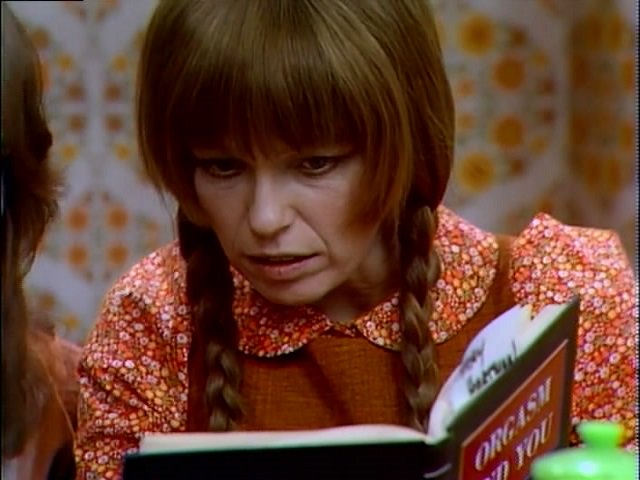
Review and Commentary:
This is a highly quotable episode, which is only natural since it's also the most purely comic show so far. No high drama in today's episode.
We start off with a very funny scene at the library, where Mary has arrived to pick up the sex books she reserved. If her discomfort with Mrs. Delorean in the phone call ending episode 5 wasn't bad enough, she can't cope at all with talking to the male librarian (Ken Olfsen) she finds in her place.
He's a bit smarmy, but does seem to be genuinely trying to help. He understands right away why Mary is there, but lets her take her time in admitting it. "It's mostly married women who take out books on sexual problems," he assures her.1
MARY: I'll just take these for her. You see, she's doing a report on the subject. Well, it's not exactly on the subject, it's on inanimate objects. Do inanimate objects have sex drives, you know? I mean, chairs, tables, books. . . do they do it?
It's a funny scene in concept, but it really comes alive thanks to Lasser. Any good actress could play a scene as ripe with comic discomfort as this is and made it funny. But Lasser has her own unique brand of bizarre tics and mannerisms that lift the scene well above its built-in potential.
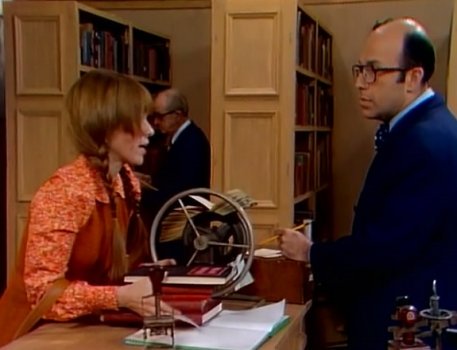
MARY: Could you just put these in a brown paper bag, please?
Next we see Tom and Charlie in the auto plant break room, where Tom is clearly still in a terrible mood over his fizzled romantic evening with Mary. He curses the perpetually out of order coffee machine, while Charlie contemplates his lunch complaisantly, explaining to Tom just how much little things can mean:
CHARLIE: You know what that sandwich is?
TOM: What?
CHARLIE: That's a love song.
TOM: Oh, brother.
CHARLIE: That's a poem. That's a kiss.
TOM: Charlie, it's a tuna fish sandwich.
Tom is so literal in his outlook, he fixates on the mundane matter of how Charlie can possibly tell it's chunky tuna after it's been all mashed up.
CHARLIE: Cause I know Loretta! Don't ask me how I know my woman! Loretta knows I like chunky tuna. She buys it for me special. Just one of the million ways she shows she loves me.
Tom could take a serious lesson from Charlie: if he allowed himself to, he could read the same kind of expressions of love for him in parallel gestures from Mary, from her making sure his dinner is ready at the exact moment he finishes his Schlitz, to her never-ending battle against waxy yellow buildup. But Tom is too insecure to see it. Compared to Charlie, Tom is a GQ cover model, but ironically, it's the schlubby Charlie who's secure in his marriage (to a much younger, more attractive spouse), so much so that every tuna sandwich is a reaffirmation of love.
Charlie tries to get Tom to open up, but to no avail. Unfortunately, his advice, rather than helping, most likely cut Tom to the quick: "There never was anything wrong with a marriage that couldn't be cured by a little lovey-dovey."
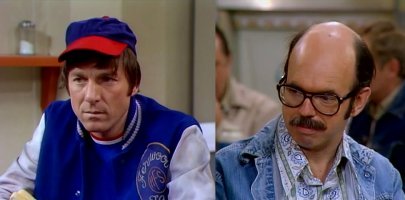
Next we get the introduction of another new character, Mae Olinsky (Salome Jens). All the men leer after her in a manner that would be considered straight up sexual harassment today, but she takes it all in a pleasant spirit. Maybe a bit too pleasant for her own good. She sits down with Tom and Charlie, and tells Charlie that his overtime pay is ready for him to pick up at Payroll. Charlie is deliriously happy, as this check will finally give him enough money to book the studio time to record Loretta's demo, her surefire ticket to super-stardom.
CHARLIE: That puts me over the top, and on Chunky Tuna Day, too! It's like my daddy said, 'It's better to be born lucky than good looking.'
MAE: And you were born both.
No doubt about it, Mae is flirtatious, with pretty much every male whose path she crosses. After she leaves, Tom expresses outrage at how the men treat her. It's an interesting and sympathetic note for the character given how regressively we've seen him act in the bedroom. Somehow I doubt, though, that his feelings stem from a streak of true progressiveness growing inside him. There seems to be something a bit more personal growing instead. . .
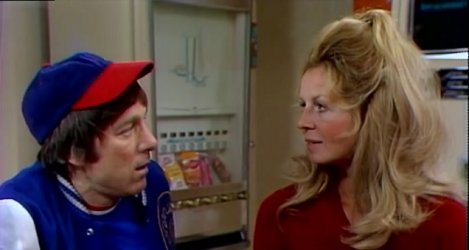
Charlie explains that the guys all treat Mae like a sex object because she's a divorcee; once a woman has been used to getting something regular, she'll go nuts without it.
TOM: Do you believe that?
CHARLIE: No, but it's like science fiction. It's fun to think about.
The scene ends on a quiet note, with Charlie offering Tom half his tuna sandwich, which Tom accepts. I like to see this as more than just a sharing of food. It's an act of friendship, certainly. But I also read it as a way for Charlie to re-offer his earlier advice in the universally symbolic form of tuna fish. It's as if he's trying to drive home the point: Notice the ways your wife shows her love for you, like I do with mine.
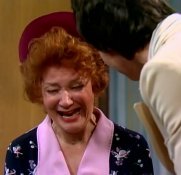
Next we see some more of the fallout from Grandpa's arrest as the Fernwood Flasher. The best thing to come out of this storyline is the introduction of Roberta Wolashek (Samantha Harper), the social worker assigned to his case. There's a delightful exchange between Martha and Roberta first. Martha confuses Roberta about what her relationship with Granpda is ("Pa-- I mean Grandpa Larkin"). It's never made clear why everyone refers to him as Grandpa, but when you consider that Martha calls her husband "Daddy", it's probably best to just go with it.
This is the first time a scene to center squarely on Martha being a complete emotional wreck, a condition that we'll see her in quite regularly from now on. "Maybe I should wait till I get home to fall all to pieces," she wonders aloud, while falling to pieces right before Roberta's eyes.
Martha clarifies her relationship to Grandpa as she leaves, taking a compliment from Roberta's misunderstanding that was never intended: "He's not my grandfather, he's my father. Do I look that young?" It's very much like Mary being distracted from her most disturbing problems by the allure of shiny new products. Martha's distracted by different things-- flattery, even if it's a self-created illusion-- but the effect is the same. All her concern about Grandpa vanishes while she basks in the glow of feeling like a young belle again, if only for a fleeting moment. It's very Blanche Dubois.
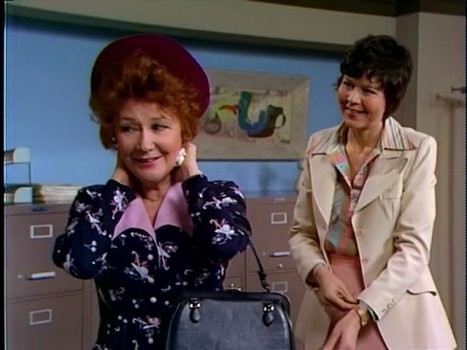
MARTHA: Do I look that young?
The dialogue between Grandpa and Roberta is where we finally start to see his character emerge in focus. I've said already, I don't find the Fernwood Flasher storyline in keeping with the Grandpa we'll come to know as the series progresses. But if I had to offer some kind of explanation for his behavior, it's that he's been so marginalized by his family and by society at large, he did what he had to, given his limited options, to grab some much-needed attention. "The Shumways never listen," he tells Roberta here, perking up in the presence of someone who truly is, for a change.
He tells Roberta the story of his first date, which he's reminded of when the subject of gravesites comes up.
GRANDPA: Did I turn you on with that gravesite story?
ROBERTA: Oh, no. You fascinated me, but you didn't turn me on.
GRANDPA: Good. Cause you can't tell that story to everybody, you know.
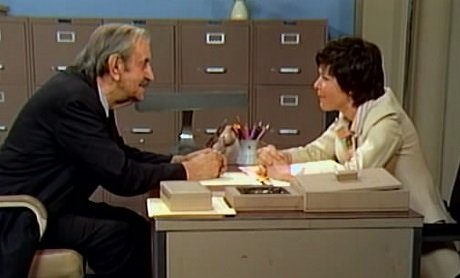
Roberta suggests they try word association, and after she explains what that is, Grandpa is a bit confused:
GRANDPA: And that's what you do? That's your job?
ROBERTA: Basically, yes.
GRANDPA: You really fell into a honey pot.
If the prior association he made between gravesites and dating wasn't odd enough, he completely throws Roberta when he offers his response to the word "smile": Death.
He explains that he's thinking of the smile that gets plastered to the faces of corpses when they're prepared for viewing in a coffin. On his old friend Al:
GRANDPA: He went 40 years without smiling. You gotta admire a man for that. Then death tapped him. . . And they put this big smile on his face, like getting hit by a truck finally made Al happy. Nothing made Al happy, and he deserved the right to go out frowning.
Roberta seems not just surprised at Grandpa, but actually quite taken with him.
ROBERTA: Mr. Larkin, I adore how your mind works.
GRANDPA: I wish you met me earlier, when more of it was working.
ROBERTA: Oh, there's plenty left. Just plenty.
The last scene is another very funny one, opening with Mary trying to decipher one of her books, "Orgasm and You", with Cathy's help. Cathy is entirely blase about the book's content, but Mary is in shock. "Look at this. A person could get injured doing that. He could sprain an ankle."
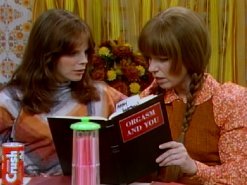 Cathy is often described in reviews of the series as oversexed, but I don't find that an accurate characterization at all, one that's perhaps influenced by unconscious sexism. Cathy is never shown to be anything but a serial monogamist, although one who goes through boyfriends much faster than any normal person does. She's sexually free with the (many) men she loves, but that doesn't make her some kind of a sex addict. This is illustrated well in her reaction to the sexual practices depicted in the book that so shock Mary (which we never see, of course): "You think that's unconventional? When two people are in love, nothing is unconventional." Cathy's problem isn't sexual overdrive, it's that she falls in love far too easily, and far too fast.
Cathy is often described in reviews of the series as oversexed, but I don't find that an accurate characterization at all, one that's perhaps influenced by unconscious sexism. Cathy is never shown to be anything but a serial monogamist, although one who goes through boyfriends much faster than any normal person does. She's sexually free with the (many) men she loves, but that doesn't make her some kind of a sex addict. This is illustrated well in her reaction to the sexual practices depicted in the book that so shock Mary (which we never see, of course): "You think that's unconventional? When two people are in love, nothing is unconventional." Cathy's problem isn't sexual overdrive, it's that she falls in love far too easily, and far too fast.
The biggest plot development of the episode occurs when Heather arrives, running into the kitchen frantically, yelling, "He followed me!" while she grabs some sweets from the cupboard.
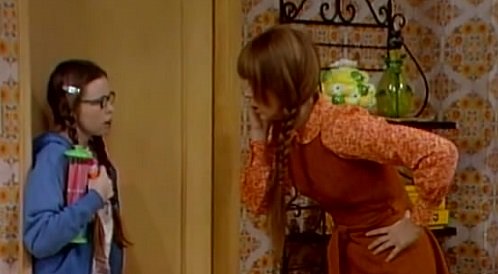
HEATHER: I'm going upstairs and lock myself in my room. I'm never coming out. I'll probably starve to death. Goodbye.
MARY: [calmly] Goodbye.
More of Mary's subideal parenting here. You'd think she'd have a bit more dramatic a reaction than this. She does eventually, but only after getting frustrated with Cathy's insistence on proper grammar while discussing the Lobardi murders.
CATHY: Not murder, murders. It's plural, with an 'S'. . . because more than one person got murdered. There were 5 Lobardis, 8 goats, and 2 chickens.
MARY: No, there were 5 Lobardis, 8 chickens and 2 goats. Cathy, I can't stand around here arguing about grammar! I have a daughter who needs me!
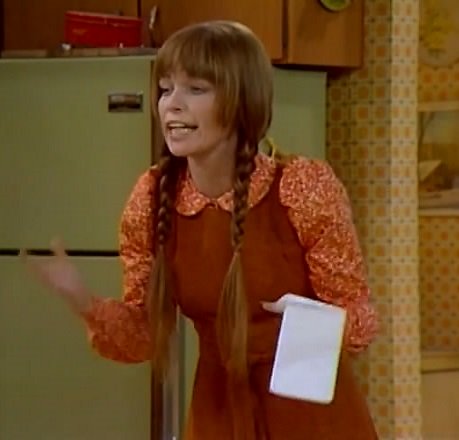
Only then does Mary actually go after Heather, in a miserable attempt at mimicking a loving mother-daughter relationship:
MARY: Heather! Heather, I know you need me. Let me help you.

HEATHER: [offscreen] Leave me alone!
. . .and Mary marches right back into the kitchen without missing a beat.

Not much high drama in this episode, but it overflows with great dialogue. It simply staggers the mind that the writers could produce scripts of this caliber 5 days a week for 26 straight weeks.
1Now there's a line that dates this show to 1976. I hardly think that would be an accurate statement today. Back
Actors:
Director:
- Log in to post comments
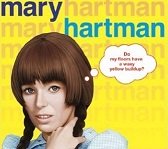
Comments
RedOwl
Mon, 01/13/2014 - 18:53
Permalink
The demonstration record
I wonder if Charlie's repeated use of this phrase was an ongoing joke - it's so clunky! Surely "demo" wouldn't have gone over anybody's head. Also - this may have been in another episode, but the moment where Tom begins to ask a question, only to have Charlie clarify "About the country music business?" has me in stitches every time. So absurd.
And Roberta is just lovely. Her interactions with Grandpa are charming, indeed. She's virtually the only person to use his actual name.
Forever Fernwood
Tue, 01/14/2014 - 13:11
Permalink
The casting
The casting on this show was phenomenal. The CD went out of her way to find the most unusual and eccentric actors. Even the bit parts like Ken Olfson and Iris Korn as the librarians added so much color and enhanced the already brilliant acting of Louise Lasser. Samantha Harper's gentleness always impressed me. Way underutilized, IMO, and almost criminally ignored by the industry after this. Salome Jens was another gifted actress I loved so. She did film and theatre, so maybe she didn't want a more substantial part in Mary Hartman, but I couldn't get enough of her. When Forever Fernwood started, I always hoped that Mae would come back. I thought the character and actress had more depth than Shelley Fabares's Eleanor or Judy Kahan's Penny.